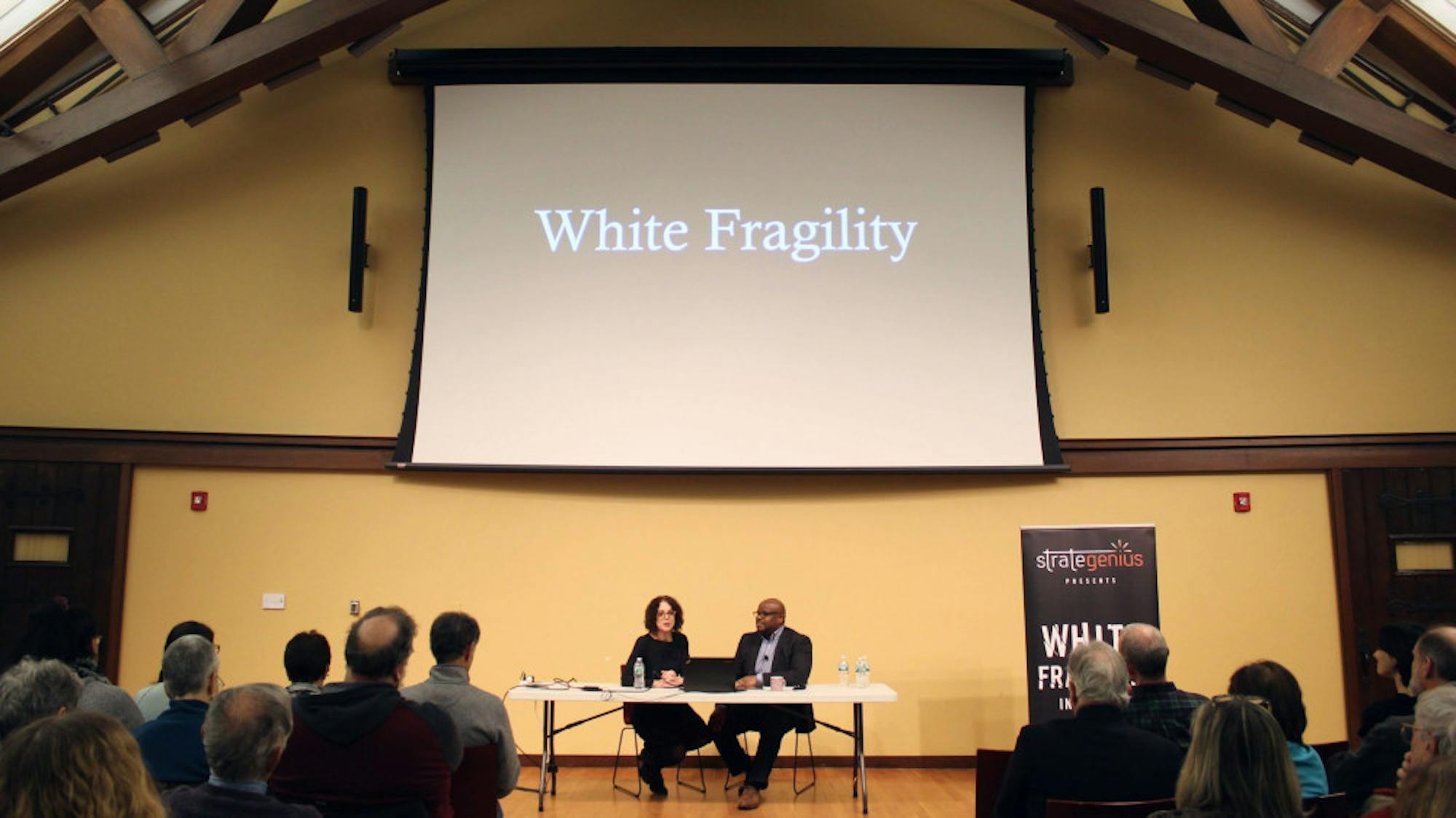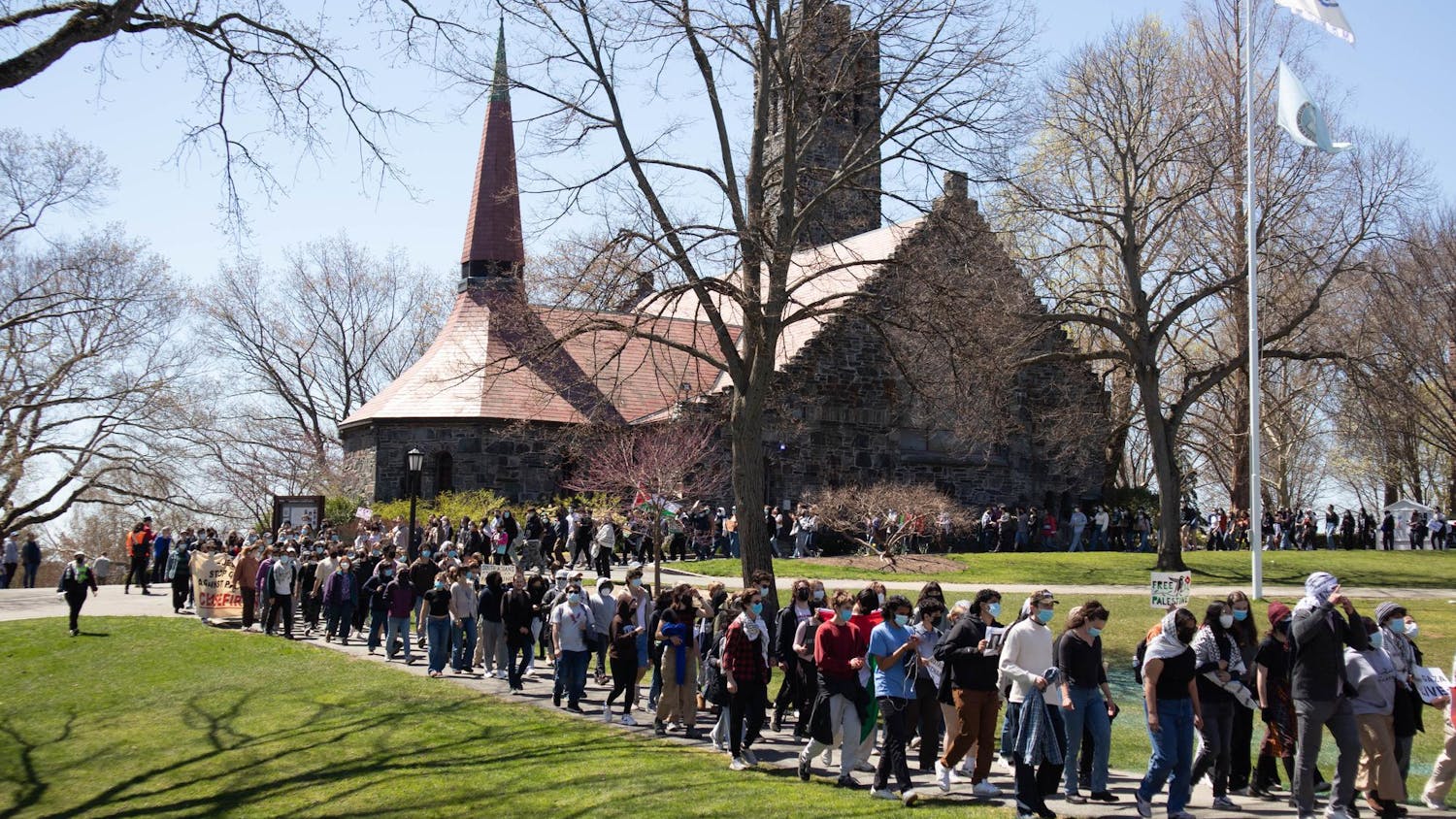Robin DiAngelo and Jack Hill held a session yesterday with the Tufts community centered around DiAngelo’s recently released book, "White Fragility: Why It’s So Hard for White People to Talk about Racism" (2018). The talk focused on the discomfort white people exhibit when their views on race are challenged, and how they can overcome this discomfort and engage instead in productive self-reflection and dialogue.
DiAngelo coined the term “white fragility” to describe the defensive reactions white people can display when they are confronted with discourse about race.
The evening also included a general overview of how white fragility develops in young Americans and what practices are required to combat it.
The first of the two speakers, DiAngelo, is an educator who earned her Ph.D. in multicultural education from the University of Washington in 2004, according to her website. She is currently an affiliate associate professor of education at the University of Washington and has conducted research in the fields of whiteness studies and critical discourse analysis.
Hill also spoke at the event, acting as a moderator to the conversation. He was introduced by Chief Diversity Officer and Associate Dean Rob Mack as an award-winning journalist, diversity consultant, and educator with background and expertise on race and education in America. Hill currently works as the middle school dean at Cambridge Friends School.
Hill began by asking whether or not DiAngelo considered herself to be a “woke” woman. In response, she explained that she “does not call [herself] woke, an antiracist or an ally.”
“That is for people of color to decide, that if at any given moment, I am behaving in antiracist-ally ways," she said. "Thinking about things like that keeps me humble and accountable as I am the least able to make that determination. It reminds me that [the term] is not a place to arrive at, but it is an ongoing struggle.”
The pair then began to work through some of the major themes and terms that were mentioned in DiAngelo's book. White fragility was their launching point into deeper discussion about whiteness in America.
Hill said that whiteness is not “fragile,” due to its cultural dominance, and that the term "white fragility" can block discussion if it is not used in the correct context.
"It is a form of defensiveness; it can shut down conversation. It can be a form of bullying,” he said.
DiAngelo clarified the meaning of "white fragility."
“It is a coddling and caretaking that so many white people need around the conversation [of racism]" she said. "The fragility part was meant to capture how little it takes to cause white people to melt down.”
She said that many white people, especially those who consider themselves progressive, view themselves as separate from racism, but they are not exempt from it.
“We must grapple with this collective ... socialization ... because we are swimming in the same water," she said.
DiAngelo also went into depth about the differences between white supremacy, whiteness, white privilege and white fragility. She defined white supremacy not as simply as “neo-Nazi racists and the KKK,” but also as the “highly descriptive sociological term for the society we live in that holds white people up as the norm for humanity and as the ideal human.”
DiAngelo described whiteness as the structure that supports white supremacy, white privilege as the result of whiteness and white fragility as doubting the legitimacy of these three things.
The pair also touched on the issue of implicit racism in schools and the “value gap” that people of color face in school, as Hill said that people of color are viewed as less valuable. He pointed out the inequality in funding between schools that are white-majority and schools that are not.
In reference to that point, DiAngelo brought up Ibram Kendi’s National Book Award-winning novel, "Stamped from the Beginning: The Definitive History of Racist Ideas in America" (2016), to illustrate that any policy that creates a racially unequal outcome should be considered racist.
"If you truly believe all people are equal, the only explanation for all these gaps you’re talking about is institutionalized discrimination … by that measure, every university and school policy is racist," she said. "So you have to get them back on the table and reexamine them.”
Hill ended the conversation with a call to action.
“There needs to be a conversation about white responsibility … about what to do when we make a racist observation," he said.
DiAngelo made her final comment to that point.
“Racism is a white problem because we created it, we maintain it and we wield the advantages of it," she said. "That does not mean we play our part in it or collude in it. However, because we control the institutions … it is ultimately on us.”
In hopes of continuing this conversation at Tufts, Mack said that he and his colleagues will be setting up spaces to respond to this conversation in the future.
Bronwyn Fulton, a first-year student who attended the event, said that the event made her want to read DiAngelo's book.
"I have pages worth of notes that I need to go back and read to really process," Fulton said. "Racism and race are such important things to talk about to understand my role as a white person, like being complicit in the system of racism but also how to resist it."
Robin DiAngelo, Jack Hill visit campus to speak about 'White Fragility'

Dr. Robin DiAngelo and Dr. Jack Hill discuss white fragility in America with the audience in Breed Memorial Hall on March 4.





